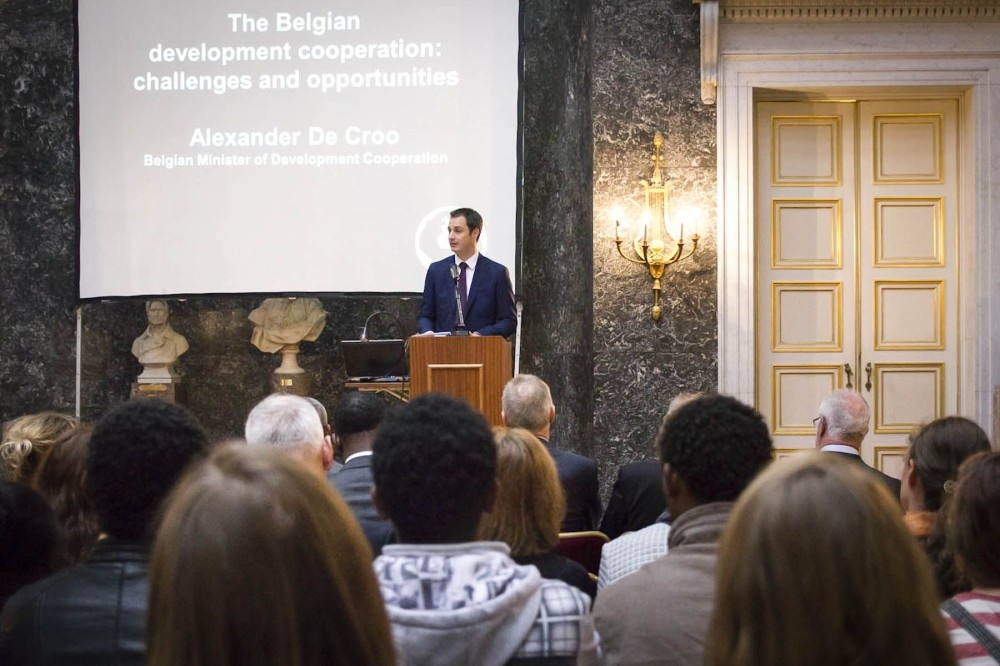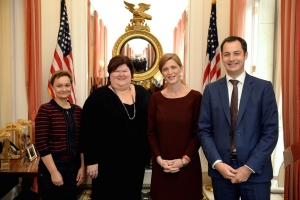Making a Difference in Ethiopia: The Impact of University Cooperation for Development
Opening Statement at 'Making a Difference in Ethiopia. The Impact of University Cooperation for Development', a VLIR-UOS event.
 Opening Statement 'Making a Difference in Ethiopia. The Impact of University Cooperation for Development'
Opening Statement 'Making a Difference in Ethiopia. The Impact of University Cooperation for Development'
Dear Dr. Kaba Urgesa, State Minister of Education in Ethiopia,
Professor Merga Bekana, Chairman of the National Election Board of Ethiopia,
Dear Professor Kora Tushune, Vice-President of Jimma University,
Honorable Ambassador Teshome Toga,
Dear professors, researchers and students,
Let me first thank you for the invitation. After just a few weeks in office, it’s a great opportunity to get to know the important actors in the field of Development Cooperation. University Development Cooperation is such an important actor.
I would also like to extend a special word of welcome to our Ethiopian guests, Minister Urgesa, Chairman Bekana, Professor Tushune and Toga. Belgium and Ethiopia foster a strong relationship that dates back more than a century. Until ten years ago, Ethiopia was one of the partner countries for Belgian Development Cooperation.
We have witnessed important developments together. What has been happening in Ethiopia is remarkable. We have witnessed strong economic growth, combined with real progress for people and leadership in the region. It has given us the possibility to phase out our governmental cooperation while strengthening our efforts in development cooperation elsewhere, in places and countries for which Ethiopia has set the benchmark.
Simultaneously, we have seen university development cooperation stepping in and strenghtening its role. A true example of complementarity indeed.
The bond between Belgium and Ethiopia has always been particularly close in the field of higher education. Belgian universities register many Ethiopian scholarship students, who are very welcome and are highly valued here in Belgium because of their excellent quality.
Through the university development cooperation, there has now been structural cooperation between Belgian and Ethiopian universities for more than a decade. Through the Flemish university umbrella organisation for development cooperation, Belgian development cooperation has invested a great deal in the cooperation with Ethiopia over the last decade. This amounts to more than 16 million euros for about 50 cooperation projects, and more than 12.5 million in scholarships, for training programmes, masters and PhDs.
We are therefore talking about a total investment of almost 29 million euros between 2003 and 2014. In the same period, 899 scholarships were awarded to Ethiopian students.
With this, Ethiopia heads the list of beneficiary countries. Our cooperation primarily ensures that we empower people. And that’s the beauty of university development cooperation. You often see a very direct impact. Is there anything more rewarding than investing in people who, in turn, multiply their human capital?
This kind of cooperation not only results in stronger universities with expanding research capacity. It also means that scientific knowledge can be applied and further developed, through government organisations, civil society, NGOs, companies.
That is why, as the brand-new Development Cooperation minister, I am happy to have the backing of the new coalition agreement. The coalition agreement explicitly refers to the key role and added value of university cooperation. University cooperation and cooperation with scientific institutions play a major role in building capacity in the South. The cooperation with the universities in Ethiopia is a good example of this.
The emphasis is on the social role of universities in the search for solutions to the serious challenges the country is having to cope with. This role should not be underestimated. Universities are the hot spots of progress and change.
They are the important beacons that allow development dynamics to fully grow and bloom. This is reflected in particular in the slogan of the Flemish university cooperation ‘Sharing minds, saving lives’.
Ladies and gentlemen,
The world is evolving rapidly, and so is the international mindset about development. In September of next year, an ambitious agenda for sustainable development covering the coming two decades will be approved in New York. It is my belief that we, the Belgian development cooperation, should evolve accordingly.
We must adapt to new international evolutions, and find connections with new insights. In other words, the Belgian development policy must reform itself in the coming years.
One of the major points that we must keep in mind here is that we must enhance the quality and results of our cooperation. As you are all aware, we must do this against the backdrop of a difficult budgetary situation.
This does not mean, however, that our country is reducing its commitments in the field of development cooperation. Quite the contrary, I am convinced that we can enhance the quality and performance of our cooperation by steering our development policy in a new direction.
A direction in which empowerment and the strengthening of people takes centre stage. An approach that also strongly highlights the importance of human rights as an engine for progress, and the role of the economic resilience of people and society as a crucial component of the development agenda.
Our country’s ambition is to have a greater impact in the world of tomorrow with our Belgian development policy.
Whether we will succeed in this ambition lies not only in my hands. It lies in our hands. In our ability to reflect together on how we can make the difference in the field for the most vulnerable. Just like we did when Ethiopia was a partner country of the Belgian governmental development cooperation. And just like the university development cooperation between Ethiopia and our country has done in recent years.
I am therefore very much looking forward to concrete stories of how the university cooperation between our countries has made a difference for people – in Ethiopia, but also in Belgium – in recent years.
I thank you.


